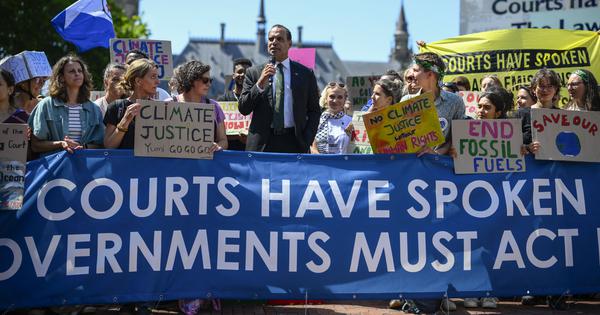 |
|
The International Court of Justice (ICJ) has delivered a landmark advisory opinion clarifying the legal obligations of states in addressing climate change, a decision hailed as a transformational shift towards climate justice. This opinion, requested by the United Nations General Assembly following a six-year campaign led by Pacific Islands students, spells out in unequivocal terms the responsibilities of states under international law and climate treaties to mitigate climate change and ensure planetary survival. The court's findings are significant because they pave the way for holding states accountable for fossil fuel emissions and the resulting climate harm, particularly resonating with vulnerable Pacific Island states that have long advocated for climate action. The ICJ's opinion specifically addresses two critical questions: the obligations of states to address climate change for current and future generations under international laws, including human rights law, the United Nations Charter, the Law of the Sea, and climate treaties and agreements; and the legal consequences states face if they fail to meet these obligations and cause serious climate harm. The court's response to these questions sets a new precedent for climate accountability, moving beyond aspirational goals to concrete legal requirements.
A central tenet of the ICJ's opinion is the assertion that the failure of states to take measures to reduce greenhouse gas emissions, including continuing fossil fuel production, granting exploration licenses, or providing fossil fuel subsidies, constitutes an internationally wrongful act. This pronouncement is a direct challenge to the continued reliance on fossil fuels by many nations and underscores the urgency of transitioning to cleaner energy sources. Furthermore, the court emphasizes that states have an obligation to regulate private actors with due diligence to ensure their activities align with climate goals. This aspect of the opinion is crucial because it extends responsibility beyond government actions to include the behavior of corporations and other private entities that contribute to greenhouse gas emissions. The court's determination that it is scientifically possible to determine the emissions contribution of each state, both currently and historically, is also noteworthy. This finding addresses concerns raised by some states about the difficulty of assigning responsibility for climate damage. The ICJ's assertion that injured states can separately invoke the responsibility of states committing wrongful acts that caused climate harm and seek reparations reinforces the principle of accountability and provides a legal pathway for redress for those most affected by climate change.
The ICJ's advisory opinion also addresses the issue of intergenerational equity, underscoring the need for action to safeguard the planet for future generations. This emphasis resonates with young people and provides them with a powerful tool for advocating for climate justice. The court's pronouncements highlight the importance of adhering to both customary and international laws, as well as climate treaties such as the United Nations Framework Convention on Climate Change, the Kyoto Protocol, and the Paris Agreement. However, the ICJ makes it clear that merely preparing Nationally Determined Contributions (NDCs) as obligated by the Paris Agreement is not sufficient. States must also ensure that they are collectively moving towards the common goal of curbing emissions. Ralph Regenvanu, Vanuatu Minister of Climate Change Adaptation, expressed that the ICJ's opinion exceeded expectations by directly addressing fossil fuels and reiterating that it is wrong for states to issue exploration licenses or to subsidize or produce fossil fuels. This statement underscores the significance of the ICJ's stance on fossil fuels, which directly challenges the practices of many nations.
Margaretha Wewerinke-Singh, legal counsel for Vanuatu’s case, highlighted the two-fold contribution of the advisory opinion. First, the court outlined the entire spectrum of obligations applicable to states that have caused climate change. Second, it asserted that states that fail to regulate fossil fuels and continue with subsidies are liable for their actions. She emphasized that when states violate their obligations and commit wrongful acts, they must cease those actions and provide reparations for the injuries they have caused. This interpretation of the ICJ's opinion reinforces the principle of the 'polluter pays' and establishes a foundation for holding states accountable for both current and past emissions. Experts from the Center for International Environmental Law (CIEL) commended the ruling for providing a legal basis for climate accountability. Joie Chowdhury, a senior attorney at CIEL, stated that the ICJ's opinion reinforces what frontline communities have long demanded: that justice means remedy. Sebastien Duyck, another senior attorney at CIEL, noted that the ICJ's recognition of new connections between conduct and legal norms, such as the idea that failing to curb fossil fuels-related emissions can violate international legal obligations, opens the door for further legal claims.
The implications of the ICJ's advisory opinion are far-reaching, extending beyond legal proceedings to influence multilateral negotiations and climate campaigns worldwide. The opinion strengthens the legal foundation for climate accountability and provides a vital lifeline to frontline communities and nations that are disproportionately affected by climate change. By emphasizing the obligations of states to reduce greenhouse gas emissions, regulate private actors, and provide reparations for climate damage, the ICJ is sending a clear message that climate change is not merely a political or economic issue but a matter of international law. This shift in perspective has the potential to transform the way climate change is addressed globally, moving from voluntary commitments to legally binding obligations. Furthermore, the ICJ's emphasis on intergenerational equity and the need to safeguard the planet for future generations reinforces the moral imperative to take urgent action on climate change. The advisory opinion serves as a powerful tool for young people and other advocates for climate justice, providing them with a legal framework for demanding accountability from states and corporations. In conclusion, the ICJ's advisory opinion is a significant milestone in the fight against climate change. It provides a clear legal framework for holding states accountable for their actions and paves the way for a more just and sustainable future.
Source: ICJ delivers an unambiguous order on states’ responsibilities to halt climate change
